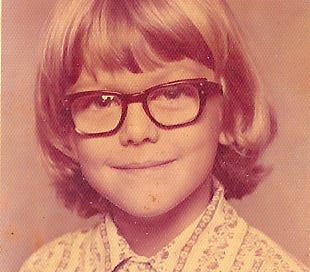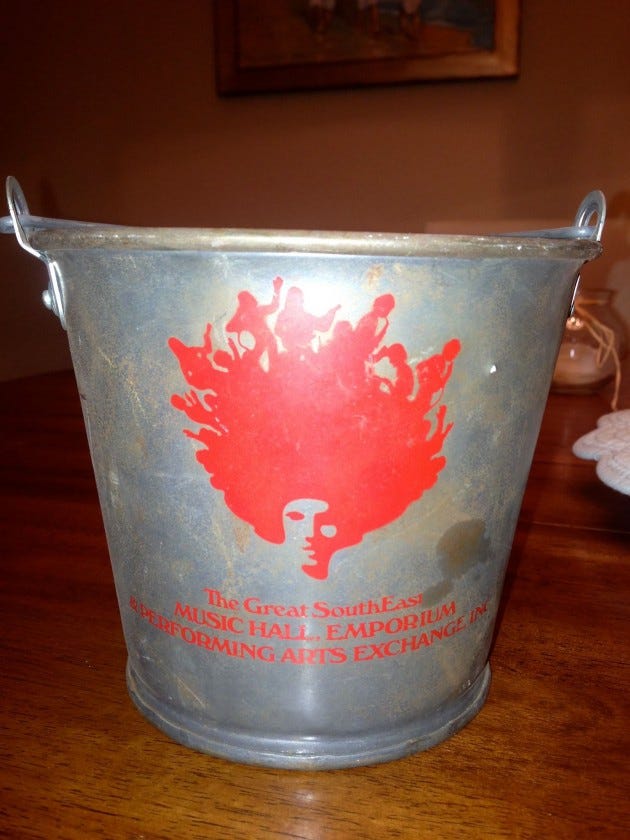Confessions of a Crybaby 1: Beside Myself in the Concert Hall
On grieving in public, thanks to a folk song, 1973
Welcome to (or welcome back to) my newsletter, my column, my stage. Thank you so much for being here. In addition to reading on, the best ways you can support my work are to 1) subscribe (options here), 2) click through and read when a post shows up in your inbox, and 3) if a post resonates with you, email it to a friend, or share on a social platform. THANK YOU.
My first real concert experience was The Nitty Gritty Dirt Band at Atlanta’s Great Southeast Music Hall in March of 1973. I was a week shy of eight years old. This show would mark the first time music made me cry, and cry hard.
The night was singular in many ways. My brother and I accompanied our mother, Mary, and her father, retired longtime Atlanta Journal-Constitution entertainment editor Sam F. Lucchese. He’d never attended any kind of show with us, and never would again. It was, in a word, odd. Our grandfather was a kind man, but not a “kid person.” My brother and I didn’t really know him well. Why was he there? I reckon Granddaddy was reviewing the concert for Variety, for whom he freelanced into his 70s.
The Nitty Gritty Dirt Band was riding high on their seminal Will the Circle Be Unbroken album, released the previous year, and which my mother owned. I now realize that album, on which Mother Maybelle Carter, Merle Travis, Doc Watson, and Earl Scruggs guested, introduced me to old-time country music, and what we now call “Americana.” The two LPs of WTCBU shared airspace in our home with the Beatles, Simon & Garfunkel, Janis, Sly, the soundtrack to Hair, et al. Will the Circle made an impression I appreciate ever more. I feel fortunate.
Somewhere in my mother’s home is a 1974 promo 8x10 of the band, shirtless and laughing. I recall she had a totally understandable crush on the smokin’ hot harmonica player, Jimmie Fadden. (Still touring with the band in 2023, by the way.)
Google tells me The Nitty Gritty Dirt Band played a six-night stand at the Great Southeast Music Hall in 1973, March 12th through the 17th. The venue was in the elbow of Broadview Plaza, a shopping center a few miles from our neighborhood. The Kmart was on one end, the Waffle House on the other. In the early 80s I would log a lot of wee small hours at that Waffle House. The Great Southeast Music Hall would be long gone by then.
March of 1973 marked my first full springtime as a fatherless kid. My amateur musician dad had died eleven months previous, after crashing his car into an embankment while drunk. He was thirty. He and my mom had been long divorced, and estranged, but he was just coming back into our lives, making an effort. My brother and I adored him. His death was a life-altering blow, a crushing lesson in how a beloved can be here one day, gone forever the next, with no warning.
Life had moved on for seven-year-old me, but grief is a strange beast with its own schedule, outside of linear time. Although there are no rules, I have learned the second year is often harder than the first. Anniversaries and such.
As my mother, brother, grandfather, and I set out for the Great Southeast Music Hall, the 1st anniversary of my father’s death was approaching.
While the Nitty Gritty Dirt Band’s show would be my first indoor concert experience, I’d seen live music prior. My mother was frequently at the epicenter of the rising counterculture, helping lay the foundations for the progressive city Atlanta has become, and which her elders (not her father) intensely feared. Live music was almost always involved. Mom was marching, protesting, getting her hands dirty, memorably courageous in her activism, all while putting food on the table by working for federally-funded Equal Opportunity of Atlanta, part of Lyndon Johnson’s War on Poverty, which, many are surprised to know, Nixon had renewed. (Nixon also created the EPA. It was a different time.)
When not working – and sometimes while working – Mom had taken my brother and me to arts festivals and events as far back as I can recall. We were free-range kids. I was accustomed to the sound of amplified live music, but it was usually outside and ramshackle. I’d sat in a circle with my friends listening to my father sing folk songs as he accompanied himself on acoustic guitar. In fact, that is my last memory of him.
Still, the experience of crowding into a music venue with strangers was new. Upon entering the Great Southeast Music Hall, my senses immediately brimmed. Little did I know – or maybe I did somehow know – such a space would become a kind of church for me. I was not afraid, but wide-eyed, quietly excited.
The 500-capacity venue was packed, with the usual nicotine haze that hung in virtually every interior back then, even airplanes, restaurants, and cinemas. I recall thick, damp carpeting. Smell of weed, sweat, patchouli. Potpourri of my childhood. I also recall seeing buckets – like milk pail buckets – full of beer.
It was a feast for the senses, the electricity of anticipation crackling in the dense air. Cushions on the floor, benches and wooden seats, overfull ashtrays, orangey cigarette embers at my eye level. I recall no other children besides my brother and me.
The lights went down, and the band bounded onstage and launched into their set. Wow. A wave of energy rose from the audience. These guys could play. Multi-instrumentalist John McEuen in particular. I had never seen or heard anything like it – guitars, bass, banjo, fiddle, accordion, drums, harmonica, all distinct, all of a piece, all wielded by elite musicians. The stories between the songs, the connection between band and crowd, the laughter, the contagious joy. Exhilarating. I settled in, my family around me, three generations absorbing music as one. I could get used to this.
Everything was copacetic until the band performed their version of Jerry Jeff Walker’s timeless waltz “Mr. Bojangles.” NGDB had had a hit with it in 1971, so I’d heard it on the radio, but never live. A male dancer appeared in a spotlight, dressed in rags, hat brim obscuring his eyes. He acted out the song, gracefully vaulting into the air, clicking his heels, lightly touching down. “After twenty years he still grieved…”
This confluence of words, music, light, shadow, and movement ushered my father into my mind, my body. I began to cry uncontrollably. The sadness blindsided me like a sneeze. A song had never made me cry before, much less unhinged and in public. I was suddenly beside myself. This lack of control embarrassed me. Why now? At this inopportune time?
It was actually the perfect place and time for a song to break me down. I was in a kind of tabernacle, expertly designed to elicit exactly this: buried, truthful emotion. Multiple points of attention/energy focusing on what’s onstage, enabling that activity to exert maximum power – a transference I now know well.
Like a church, a temple, any devotional space, we listen raptly, but we are not passive. The audience/congregation is part of the performance, many opened hearts engaged as one.
It was all new to me. I was unprepared. But it was good. It was useful.
Although passionate people, we weren’t a religious family. My mother, having been raised strict Catholic, had pointedly rebelled, and identified as agnostic. I am glad of that. But, like a lot of 70s families, the reflective nature of a religious practice of any kind wasn’t a thing for us. We’d not attended my father’s funeral, had not talked much about him after his death. My brother, mom, and I each grieved separately, in our own ways. No memorial, no shrine, no framed photos of him in the house. Very few stories shared.
The impulse to move on from tragedy was strong. There’s a future out there to grab; the past will only drag us down. We must escape it.
Only when I became a parent would I more fully understand this impulse. The past can really be a bitch. You pry that open, things can get unwieldy. But sadly, the past is not going anywhere. Rituals exist to handle exactly such things.
I had not done any ritualized grieving for my father. The Nitty Gritty Dirt Band, singing Jerry Jeff Walker’s song in the Great Southeast Music Hall in 1973 gave me just what I needed: communal space to weep among my family, even though they didn’t understand what was happening. In truth, I myself didn’t fully grasp what was happening to me.
When my distress became evident, my mother and brother and grandfather repeatedly asked what was wrong. I could not articulate anything. I was a seven-year-old mess. They kept asking. I vividly recall thinking, I need to say something to shut them up.
“It’s too loud,” I said. This was a lie. But it worked.
My mother walked me to the graffiti’d lobby area, telling my grandfather, “He says it’s too loud. We’re gonna go.” Nobody seemed put out.
Once in the cool night air, I was able to calm myself down. The spell was broken.
That 1973 night was my first experience of music as time-travel device. Like magic – actually exactly like magic – The Nitty Gritty Dirt Band singing Jerry Jeff Walker’s song at the Great Southeast Music Hall comprised the ingredients for a potent spell that revivified my father within me for a few moments. All elements needed to be present: the sonic waves surrounding me like water, the collective opening of all the hearts in the room, the song, the artists, my closest kin beside me, maybe even the buckets of beer. Together, all tapped into a deeper stratum within me, beyond time, as in dreams. Abracadabra.
My father’s spirit was alive… then gone again. Ah, there’s the rub.
Perhaps there, too, is the reluctance to engage the past in any way – through words, music, storytelling, photographs. Whatever you revivify, you lose again, after the fade. Who wants to re-grieve, by accident or by design? Fair question. To those who ask, I will note my subsequent, life changing discovery: through that same door flows joy, and the strength needed to deal with all of it.







I heard that song a few months after my best friend died (Shwaggy, my dog) and I cried uncontrollably, but it felt good. Great story 🙂
This was beautiful, Robert. I still have my bucket, too